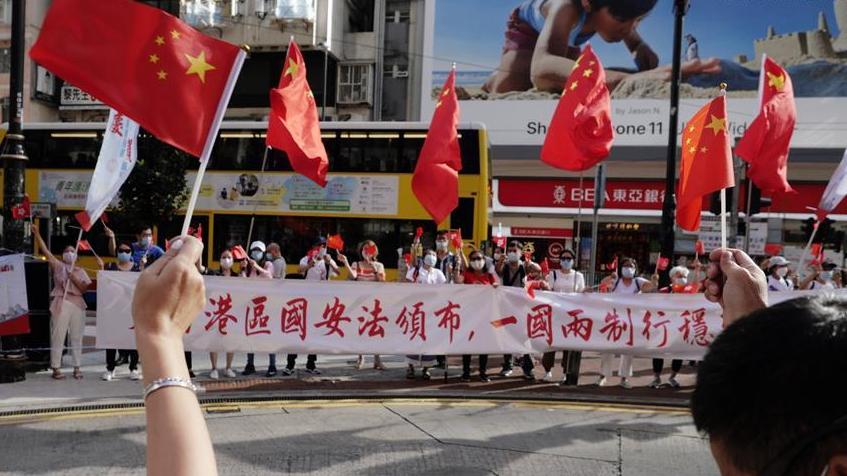
Hong Kong residents celebrate the passage of the Law of the People's Republic of China on Safeguarding National Security in the Hong Kong Special Administrative Region (HKSAR) in Causeway Bay of south China's Hong Kong, June 30, 2020. /Xinhua
Hong Kong residents celebrate the passage of the Law of the People's Republic of China on Safeguarding National Security in the Hong Kong Special Administrative Region (HKSAR) in Causeway Bay of south China's Hong Kong, June 30, 2020. /Xinhua
The Hong Kong Special Administrative Region (HKSAR) government Friday expressed strong opposition to the passage of the "Hong Kong Autonomy Act" by the U.S. Congress.
"Once again, we urge the U.S. Congress to immediately stop interfering in HKSAR affairs. The act and the so-called 'sanctions' are totally unacceptable. They will not deter us but will only harm the relations and common interests between Hong Kong and the U.S.," said a spokesman for the HKSAR government in an official statement.
Stressing that the national security legislation is invariably the jurisdiction of the central government of any country, the HKSAR government described the U.S. move as a "blatant breach of obligations and respect between nations," warning that countermeasures may be adopted by the central government as well as the HKSAR government as and when needed.
Read more:
China's national legislature voices strong condemnation of U.S. passage of 'Hong Kong Autonomy Act'
The spokesman said that for those who were still ignorant about the HKSAR's constitutional order, they should be reminded that the national Constitution and the Basic Law of the HKSAR form the constitutional basis of the HKSAR. The implementation of the "One Country, Two Systems" principle in HKSAR is entirely the internal affairs of the People's Republic of China(PRC). No other state or legislature has the right to intervene, directly or indirectly, in those internal affairs.
Some members of the U.S. Congress claimed that the passage of the "Hong Kong Autonomy Act" was in response to the enactment of the national security law in Hong Kong. This is totally misguided, said the spokesman, adding that national security is a matter that falls under the purview of the central authorities and the national security law enacted on June 30, 2020 by the National People's Congress (NPC) Standing Committee. It is a national law, which by virtue of relevant provisions in Article 18 of the HKSAR Basic Law shall be applied in the HKSAR.
"In view of the increasingly pronounced national security risks faced by the HKSAR, especially since the escalating violence and social chaos last June, close to three million Hong Kong people took part in a signature campaign over eight days to show their support for the enactment of national security legislation by the central authorities, which was considered timely, reasonable and rational," the spokesman said.
The national security law for the HKSAR seeks to prevent, suppress and impose punishment for four types of acts and activities that seriously endanger national security. It targets an extremely small minority of people without adversely affecting the basic rights and freedoms legitimately enjoyed by Hong Kong people. It is an important step to improve the "One Country, Two Systems" institutional system and represents an essential and timely decision for restoring stability in Hong Kong.
The law will not affect the high degree of autonomy, judicial independence and the rule of law in Hong Kong, according to the spokesman.
The spokesman reiterated that any "sanctions" imposed under the "Hong Kong Autonomy Act" will not create an obligation for financial institutions under Hong Kong law. "We urge the U.S. side to act responsibly by refraining from taking measures that may potentially affect the normal operations of financial institutions and the vast number of customers they serve."